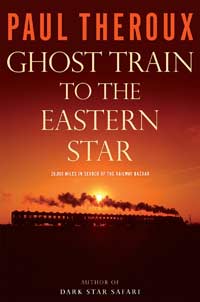Paul Theroux to Speak at UCSB
Human Stories from the Legendary Travel Writer

Cheap airfare and easy car rentals long ago eclipsed trains as the preferred means of travel for the world’s leisured classes. To Paul Theroux, this is not necessarily a welcome development. Near the beginning of his new book, Ghost Train to the Eastern Star, he writes that trains offer “probably the best way of getting a glimpse of how people actually live-the backyards, the barns, the side roads and slums, the telling facts of village life, the misery that airplanes fly over.”
This Sunday, Theroux will appear at UCSB’s Campbell Hall to share stories from his long history of train travel. Today a celebrated novelist and travel writer, he launched his career in 1973 with The Great Railway Bazaar, a seminal and very popular book about a trip he took-by train-from London to Tokyo via India and Southeast Asia, with a return on the Trans-Siberian Express. This was followed by The Old Patagonian Express (Central and South America in the late ’70s), and Riding the Iron Rooster (China in the late ’80s).

Ghost Train to the Eastern Star retraces the route Theroux took in The Great Railway Bazaar. Beginning in London, he rides through Europe to Turkey, across the “‘stans” of the former Soviet Caucasus countries, into India and Southeast Asia, up through China, and then across Siberia. In many cases he finds a world less well-off than the one he visited 30 years ago. The “austere torpor” of the ‘stans wears him down; in India he finds that it’s best to “keep your gaze upward-the foreground is generally horrific;” and China, he decides, “exists in its present form because the Chinese want money.”
Theroux is famously prickly, and such generalizations might suggest he’s myopic. True or not, he’s as much fun to read today as ever, and Ghost Train to the Eastern Star offers a lot more than the typical travelogue. In Amritsar, in the Indian Punjab, a man sees Theroux writing in his notebook and asks whether he is a journalist. “Sort of,” Theroux replies. This goes for the book, too. It’s something more and less than journalism; the who, what, when, where, and why are mapped out idiosyncratically, anecdotally, and impressionistically. Theroux doesn’t attempt to be comprehensive or authoritative about the places he visits and the people who inhabit them, but instead offers glimpses, little stories about happenstances and chance encounters, which he intersperses with literary musings, bits of personal history, and generalizations about people and their discontents.
In a recent telephone interview, Theroux confirmed that his intent in writing Ghost Train was literary, not sociological. “My purpose was to report the encounters I had, and not to try to draw huge conclusions from them,” he said. “That’s something for Tom Friedman, or a political analyst or sociologist. My readers don’t want to hear me pontificate about the big issues. They want me to make human contact. Human contact is often the most telling thing.”
Many if not most of the places Theroux visits are, in greater or lesser measure, poverty-stricken and badly governed (the ‘stans are particularly grim). He winds up surrounded by one morally fraught situation after another: a despotic, crazed king in Turkmensitan, an India starkly divided by wealth and poverty, a Burma destroyed by military dictators. So it is striking how little energy he expends on moral denunciation-a decision, he said, that he made very consciously. “Moralizing makes me sound like a fogy. As a novelist, I think dramatic episodes, dramatic encounters, should speak for themselves.”
Nevertheless, Theroux can’t help arguing that on the basis of what he saw on this trip-grinding poverty paired with fabulously wealthy ruling classes-it’s a myth that globalization and the spread of technology are creating a world of equal economic opportunity (a notion propounded most visibly by New York Times columnist Thomas Friedman). “Friedman says the world is flat-people can go anywhere, do anything today. But I think the world is round. I’ve been in a lot of places, including on this trip, where people see no way out. They’d like to leave, and they think of leaving, but there’s no way for them.”
Theroux has been dinged by a number of reviewers of Ghost Train to the Eastern Star for trucking in the kind of breezy generalizations he deplores in other travel writers. That may be a valid criticism, but his generalizations are frequently funny and always stylish, and, anyway, a lot of them are hard to disagree with. Over the phone, he summed up his trip this way: “My conclusion was that most people in the world are badly governed, and they would do anything for a quiet life. But it’s very easy to disrupt a quiet life.” A generalization? Yes. Breezy? Perhaps. True? Most definitely.
4•1•1
Paul Theroux will speak at UCSB’s Campbell Hall on Sunday, October 12, at 4 p.m. For tickets or more information, call 893-3535 or visit artsandlectures.ucsb.edu.



